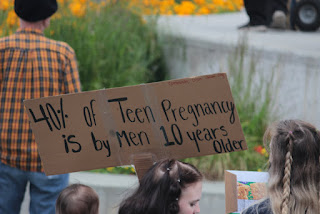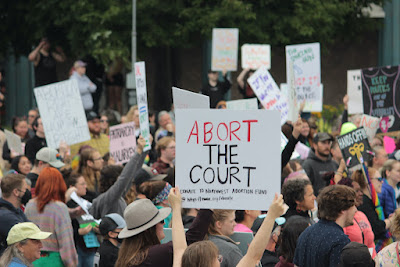This afternoon, people gathered at the Parkstrip and marched to the Anchorage Town Square to protest Friday's Supreme Court decision on abortion. My rough estimate of the crowd is 400-600.
Observations: The crowd was younger than the demonstration on May 8, 2022 when the decision was leaked. The organizers also talked a lot about voting this time, which was missing at the previous demonstration. Including voting no on whether Alaska should have a constitutional convention. (The constitution requires such a vote every ten years.) Conservatives want such a convention to do (at least) two things:
- Remove the right to privacy in the constitution
- Change how judges are selected in Alaska (by a non-partisan commission which evaluates people applying for judgeships by reviewing surveys of judges, attorneys, juries, court employees, and court watchers. Top candidates are passed on to the Governor to choose from.
During the 1960's the protesting against the Vietnam war was invigorated by the fact that all 18 year old men had to register for the draft and stood a decent chance of being sent to Vietnam to fight. All their friends and family had a very personal interest in the war ending.
Today's young folks have been give an equally important stake in fighting Dobbs v. Jackson's Women's Health Organization. This time it's all women of child bearing age who are on the line, but since women don't need an abortion unless a man has been involved, men too have a vital stake. And if the Vietnam War protests are any predictor, the people fighting to make abortions legal again aren't going away.
Here are some photos from today's protest.
Facts of the caseCarrie Buck was a "feeble minded woman" who was committed to a state mental institution. Her condition had been present in her family for the last three generations. A Virginia law allowed for the sexual sterilization of inmates of institutions to promote the "health of the patient and the welfare of society." Before the procedure could be performed, however, a hearing was required to determine whether or not the operation was a wise thing to do.QuestionDid the Virginia statute which authorized sterilization deny Buck the right to due process of the law and the equal protection of the laws as protected by the Fourteenth Amendment?ConclusionThe Court found that the statute did not violate the Constitution. Justice Holmes made clear that Buck's challenge was not upon the medical procedure involved but on the process of the substantive law. Since sterilization could not occur until a proper hearing had occurred (at which the patient and a guardian could be present) and after the Circuit Court of the County and the Supreme Court of Appeals had reviewed the case, if so requested by the patient. Only after "months of observation" could the operation take place. That was enough to satisfy the Court that there was no Constitutional violation. Citing the best interests of the state, Justice Holmes affirmed the value of a law like Virginia's in order to prevent the nation from "being swamped with incompetence . . . Three generations of imbeciles are enough."
Griswold v. Connecticut, 381 U.S. 479 (1965)
Argued March 29-30, 1965
Decided June 7, 1965
Syllabus
Appellants, the Executive Director of the Planned Parenthood League of Connecticut, and its medical director, a licensed physician, were convicted as accessories for giving married persons information and medical advice on how to prevent conception and, following examination, prescribing a contraceptive device or material for the wife's use. A Connecticut statute makes it a crime for any person to use any drug or article to prevent conception. Appellants claimed that the accessory statute, as applied, violated the Fourteenth Amendment. An intermediate appellate court and the State's highest court affirmed the judgment.
Held:
1. Appellants have standing to assert the constitutional rights of the married people. Tileston v. Ullman, 318 U. S. 44, distinguished. P. 381 U. S. 481.
2. The Connecticut statute forbidding use of contraceptives violates the right of marital privacy which is within the penumbra of specific guarantees of the Bill of Rights. Pp. 381 U. S. 481-486.
DECIDED Mar 22, 1972
Facts of the case
William Baird gave away Emko Vaginal Foam to a woman following his Boston University lecture on birth control and over-population. Massachusetts charged Baird with a felony, to distribute contraceptives to unmarried men or women. Under the law, only married couples could obtain contraceptives; only registered doctors or pharmacists could provide them. Baird was not an authorized distributor of contraceptives.
Question
Did the Massachusetts law violate the right to privacy acknowledged in Griswold v. Connecticut and protected from state intrusion by the Fourteenth Amendment?
Conclusion
6–1 DECISION
MAJORITY OPINION BY WILLIAM J. BRENNAN, JR.
In a 6-to-1 decision, the Court struck down the Massachusetts law but not on privacy grounds. The Court held that the law's distinction between single and married individuals failed to satisfy the "rational basis test" of the Fourteenth Amendment's Equal Protection Clause. Married couples were entitled to contraception under the Court's Griswold decision. Withholding that right to single persons without a rational basis proved the fatal flaw. Thus, the Court did not have to rely on Griswold to invalidate the Massachusetts statute. "If the right of privacy means anything, wrote Justice William J. Brennan, Jr. for the majority, "it is the right of the individual, married or single, to be free from unwarranted governmental intrusion into matters so fundamentally affecting a person as the decision whether to bear or beget a child."


















